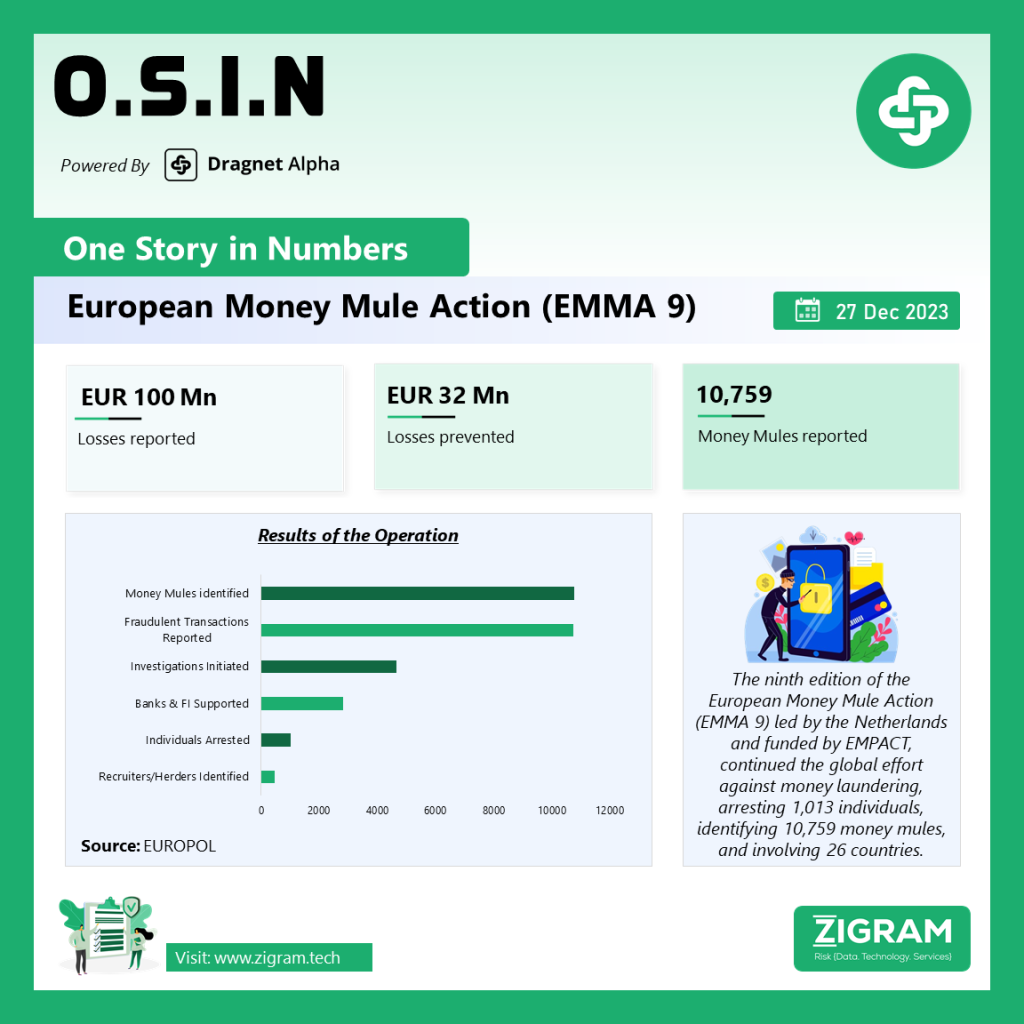Published Date:
Law enforcement agencies from 26 countries, in partnership with Europol, Eurojust, INTERPOL, and private industry collaborators, undertook the ninth edition of the European Money Mule Action (EMMA 9) to combat money laundering. Led by the Netherlands and funded by EMPACT, EMMA 9 involved operations globally, including in Colombia, Singapore, and Australia.
The operation’s impact was substantial, identifying 10,759 money mules and 474 recruiters, resulting in the arrest of 1,013 individuals worldwide. It reported 10,736 fraudulent transactions, initiated 4,659 investigations, and garnered support from 2,822 banks and financial institutions. The action led to €100 million in reported losses, with €32 million in losses prevented.
EMMA is a comprehensive international initiative emphasizing public and private sector collaboration. The European Banking Federation (EBF) played a crucial role, with around 2,822 banks and financial institutions cooperating. This collaborative effort extended to online money transfer services, cryptocurrency exchanges, online travel providers, ‘Know Your Customer’ (KYC) companies, and multinational computer technology corporations.
EMMA addressed crimes linked to money mule networks engaged in international money laundering, targeting cyber-enabled fraud against financial institutions. It aimed to enhance cross-border information exchange, facilitating arrests, seizures, and other law enforcement actions. The initiative sought to raise awareness, prevent financial losses, and address the evolving landscape of money laundering.
The EMMA initiative has proven effective in strengthening cross-border collaboration, dismantling money mule networks, and combating international money laundering. These networks often exploit vulnerabilities, such as targeting migrants from conflict zones like Ukraine, coercing them into unwittingly laundering money by opening bank accounts.
New trends in the criminal landscape include bank impersonation crimes, targeting elderly individuals, and the fraudulent use of artificial intelligence to create fake identities, bypassing KYC security. Criminals also exploit younger individuals, providing online means of payment, such as gift cards, to facilitate the purchase and resale of goods on e-commerce platforms.
Online fraud schemes, including investment scams, compromised business emails, and phishing, contribute to money laundering. The crackdown aims to disrupt these schemes, making it challenging for criminals to operate and conceal their illicit earnings.
Europol played a pivotal role in supporting EMMA, facilitating information exchange through the Joint Cybercrime Action Taskforce (J-CAT). During operational phases, Europol provided analytical support to identify connections between cross-border cases and money mule networks. Additionally, Europol coordinated the EMMA 9 awareness campaign with participating countries and private industry partners.
Participating countries in EMMA 9 included Australia, Austria, Bulgaria, Cyprus, Colombia, Czechia, Denmark, Estonia, Greece, Hong Kong (China), Hungary, Ireland, Italy, Latvia, Moldova, Netherlands, Poland, Portugal, Romania, Singapore, Slovenia, Sweden, Spain, Ukraine, the United Kingdom, and the United States. Participating agencies comprised Europol, Eurojust, and INTERPOL.
- #EMMA9
- #MoneyMuleAction
- #InternationalCollaboration
- #LawEnforcement
- #MoneyLaundering
- #GlobalEffort
- #EmpactFunding
- #Europol
- #INTERPOL
- #Eurojust
- #CrimePrevention
